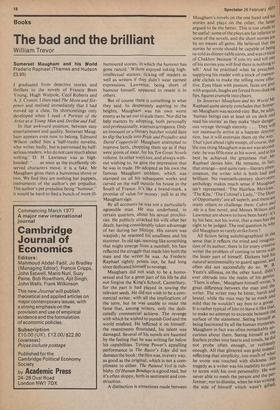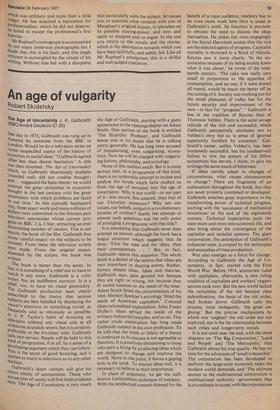Books
The bad and the brilliant
William Trevor
Somerset Maugham and his World Frederic Raphael (Thames and Hudson £3.95)
I graduated from detective stories and thrillers to the novels of Francis Brett Young, Hugh Walpole, Cecil Roberts and A. J. Cronin. I then read The Moon and Sixpence and realised immediately that I had moved up a class. Its shortcomings only developed when I read A Portrait of the Artist as a Young Man and Decline and Fall.
In that awkward position, between easy entertainment and quality, Somerset Maugham appears even now to belong. Edmund Wilson called him a 'half-trashy novelist, who writes badly, but is patronised by halfserious readers, who do not care much about writing.' D. H. Lawrence was as highhanded: . . as soon as the excellently observed characters move, it is a fake. Mr Maugham gives them a humorous shove or two. We find they are nothing but puppets, instruments of the author's pet prejudice. The author's pet prejudice being "humour," it would be hard to find a bunch of more ill humoured stories, in which the humour has gone rancid.' Wilson enjoyed taking highintellectual stances, ticking off readers as well as writers if they didn't wear earnest expressions. Lawrence, being short of humour himself, appeared to resent it in others.
But of course there is something in what they said. In desperately aspiring to the heights, Maugham was his own worst enemy as he set out to scale them. Nor did he help matters by adopting, both personally and professionally, a certain arrogance. Only an innocent or a literary butcher would dare to slip the knife into Pride and Prejudice and David Copperfield: Maugham attempted to improve both, chopping them up as if they were joints of meat, for his Ten Great Novels volume. In other ways too, and always without wishing to, he gave the impression that he was in trade. He adopted as his own the famous Maugham emblem, which was stamped on all his subsequent works and carved on the wall outside his house in the South of France. It's like a brand-mark, a promise of value for money: pull in at the Maugham sign.
By all accounts he was not a particularly agreeable man. He was underhand, in certain quarters, about his sexual proclivities. He publicly attacked his wife after her death, having considerably taken advantage of her during her lifetime. His nature was waspish; he resented his smallness and his stammer. In old age, seeming like something that might emerge from a nutshell, his face reflected the struggle that made him both the man and the writer he was. As Frederic Raphael rightly points out, he had long since dedicated himself to revenge.
Maugham did not wish to be a homosexual and for a great part of his life he did not forgive the King's School, Canterbury, for the part it had played in sowing the relevant seeds. He did not wish to be a commercial writer, with all the implications of the term, but he was unable to resist the fame that, among writers, only the dedicatedly commercial achieve. The revenge with which he wished to punish God and the world misfired. He inflicted it on himself: the resentments flourished, his talent was damaged. Several of his novels are haunted by the feeling that he was writing far below his capabilities. Tyrone Power's appalling performance in The Razor's Edge did not demean the book : the film was, in every way, as good as the original, which is not a compliment to either. The Painted Veil is rubbishy. Of Human Bondage is a good read, but it's often sloppy, both in sentiment and construction.
A distinction is sometimes made between
Maugham's novels on the one hand and his stories and plays on the other, the latter argued to be the better. This is too crude tu be useful : some of the plays are far inferior to some of the novels, and the short stories are by no means all gems. He believed that the stories he wrote should be capable of being re-told as dinner-table yarns, and was critical of Chekhov because `if you try and tell one of his stories you will find there is nothing t° tell.' And he practised what he preached, supplying his reader with a stock of memorable clichés to make the telling more effective. Eyes blaze with passion, faces are grey with anguish, laughs are forced from shaking lips, figures crumple into chairs. In Somerset Maugham and his World Mr Raphael quite simply concludes that Somerset Maugham was second-rate. But, he adds, 'human beings can at least sit on deck and read his stories' as they make 'their dangerous voyage through eternity . . . They will not necessarily arrive at a happier destina-, tion, but it will entertain them on the waY. That's just about right except, of course, that 'the one thing Maugham was not was secondrate: he was fifth-rate at his worst, and at his best he achieved the greatness that Mr Raphael denies him. He remains, in fact, that strange—and quite rare—literary phenomenon, the writer who is both bad and brilliant. No twentieth-century short-story anthology makes much sense if Maughatri, isn't represented. 'The Hairless Mexican, 'The Kite,' The Colonel's Lady,' The Door of Opportunity' are all superb, and there are many others to challenge them. Cakes and Ale is a fine novel, and Messrs Wilson and Lawrence are shown to have been hasty: it s by his best, not his worst, that a man has the right to be judged. The real question is, whY did Maugham so rarely strike form? All fiction being autobiographical in.the sense that it reflects the mind and imag tion of its author, there is for every creative writer the problem of coming to terms Wit,1 the lesser part of himself. Dickens had his, natural sentimentality to guard against, an° often did not successfully do so. W. 13.' Yeats's silliness, on the other hand, didn t ever obtrude into the realm of his gen 'There is often,' Maugham himself wrote, 3 great difference between the man and theA writer. The writer may be bitter, harsh an", brutal, while the man may be so meek anu, mild that he wouldn't say boo to a goose. It is rather typical of him to leave it like that, to make no attempt to excavate beneath the surface of the statement. Seeing himself as being fascinated by all the human mysteries, Maugham in fact was often remarkablY uncurious about them. Seeing himself as the, fearless prober into hearts and minds, he di° not probe often enough, or ruthlesslY. enough. All that glittered was gold indeed: reflecting that simplicity, too much of WM,' he wrote was touched with slickness. His tragedy as a writer was his inability to COO to terms with his own personality. He was never able to mesh the person and the performer; nor to dismiss, when he was writing, the side of himself which wasn't gifted, Which was ordinary and more than a little vulgar. He has acquired a reputation for Professionalism, which he did not deserve; he failed to master the professional's first exercise.
Mr Raphael's monograph is accompanied by too many irrelevant photographs but I doubt that this is his fault, and this single criticism is outweighed by the virtues of his writing. Without fuss but with a sharpness that particularly suits the subject, he causes you to examine what remains with you of Maugham's original impact, to speculate on its possible staying-power, and now and again to disagree and to argue. In the end you return to the novels and the stories, which is the destination towards which you have been faithfully, and subtly, led. Like all Mr Raphael's enterprises, this is a skilful and well-judged operation.



































 Previous page
Previous page